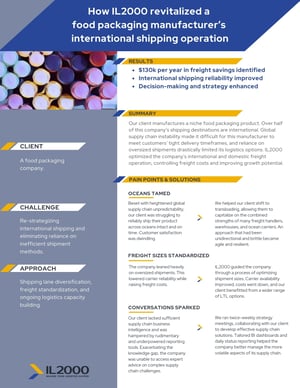SUMMARY
Our client manufactures a niche food packaging product. Over half of this company’s shipping destinations are international. In 2020, Covid-19 sent tremors of disruption through international logistics. Food packaging manufacturers across the US found they were suddenly sorely pressed to maintain the delivery reliability customers had come to take for granted. This particular company was deeply impacted for two reasons. The first related to customers’ production pipelines, the great majority of which required tight delivery timeframes for packaging materials. Additionally, our client had historically shipped its product in oversized packages – a configuration that drastically limited its logistics options.
IL2000 optimized both its international shipping operation and domestic outbound freight to make it faster and more reliable. The result: Freight costs were controlled; customer confidence and growth potential went way up.
COMPANY PROFILE
An IL2000 client for over five years, this company is a food packaging manufacturer that specializes in recycled plastic. They hold a 99% market share in a niche product — a versatile packaging handle system optimized for bottled or jarred foods and beverage products. With 60% of its clientele based internationally and a distribution model built around oversized shipments, this company faced considerable supply chain volatility.
PAIN POINTS
- Managing any expansive international shipping program during the supply chain disruptions of 2020 to 2021 was a Herculean task, but this company’s challenges were compounded by the nature of the food packaging industry itself where utmost customer confidence is key. Beset with heightened global supply chain unpredictability, our client had to demonstrate their product could cross oceans intact and on time.
- Historically, the client had sent shipments out on taller pallets, some up to 102 inches in height. While the oversized approach may have yielded efficiency gains on paper, the company was finding it difficult in practice to secure reliable, reasonably priced carriers. A reliance on bulk shipments had painted our client into a tight logistical corner.
- Like so many businesses, our client arrived at our doorstep with a giant data black hole at the center of its freight operation. This particular company had limited supply chain business intelligence, few reporting tools, and insufficient access to expert advice. They knew the latitude and longitude of global logistics were rapidly changing but lacked the data and insight to plot a new path.
CHALLENGE
From an international shipping standpoint, it was easy to name this company’s critical challenge: Reliability. Overseas shipments had to arrive on time and they weren’t. However, international volatility wasn’t the whole picture. Our client’s supply chain was trying to slot oversized pegs into standardized holes. And behind all this lurked a deeper supply chain challenge: This company couldn’t talk meaningfully about supply and distribution. It lacked the data. It lacked the BI tools to transform that data into knowledge. Most of all, it lacked the expertise to transform knowledge into actionable insight.
SOLUTION
Oceans tamed
IL2000 declared war on the export uncertainty that had plagued our client’s shipping operation for over two years. Mapping out the company’s vulnerabilities, we saw that 60% of its manufacturing revenue relied on one port, Seattle. Pre-covid, that worked. After Covid, single port reliance was riddled with organizational vulnerability. After performing a complete analysis, IL2000 found a better way.
We helped our client shift to transloading, shipping mainly from alternative ports in Houston and Oakland. This one crucial pivot opened up a huge range of new options for our client. Suddenly they could capitalize on the combined strengths of an army of freight handlers, warehouses, and ocean carriers. An approach that had been unidirectional and brittle became agile and resilient. We also addressed the knowledge problem. We set up close and constant communication to help our client fine-tune scheduling, and we rolled out a steady process of education.
Pegs standardized
On the domestic side, we moved to intermodal shipping to cut down on costs. We also optimized their packaging for improved freight outcomes. The company’s product went out in variable pallet heights, most oversized, some reaching up to 102 inches in height. For one thing, that meant our client was locked into paying a carrier to ship nothing but thin air — namely, all that wasted space a carrier had to leave above the oversized shipment. But the non-standardized peg problem was a one-two punch, because it also meant that carriers that used liftgate or roll-up door trailers couldn’t touch our client’s shipment.
We showed the company how to reduce shipment dimensions the right way. Anyone can say “make your freight smaller.” IL2000 advised on optimal-sized shipments that would maximize carrier availability, minimize costs, and keep a wide range of LTL options wide open. Money was saved, busy work reduced.
Conversations sparked
With oceans and pegs under control, we set our sights on the problem at the heart of our company’s challenges: A lack of supply chain knowledge. It’s worth pointing out here that IL2000 isn’t a software company, nor are we freight brokers, nor are we a fly-by-night consulting house. The critical factor that makes us different is that we’re an expertise-driven 3PL, and we’re passionate about equipping our clients with the skills they need to future-proof their supply chain.
To make that happen, we met with our client twice weekly to collaboratively develop effective supply chain solutions. Tailored BI dashboards augmented that conversation, supporting insight at the CFO strategic level right down to daily decision-making at the warehouse and docks. We also implemented daily LTL reporting to improve visibility over the company’s truckload freight operation along with daily international shipping reports to help our partners maintain tighter control over the more dynamic and shifting aspects of their supply chain.
Most of all, we answered questions. What had been a knowledge black hole in the company was now a vibrant focal point for innovation, efficiency gain, and competitive advantage. We got people talking.
RESULTS
- Identified freight savings of over $130k per year
- International shipping transformed from tenuous uncertainty to rock-solid reliability
- Enhanced in-house expertise equipped with customized BI and powerful reporting tools
Download the one page Case Study here


